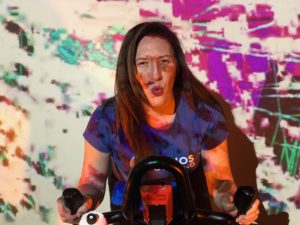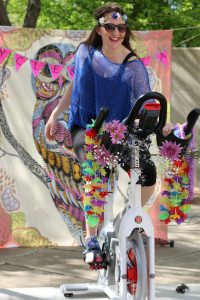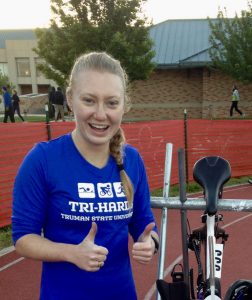As an undergraduate student, Jac Hadfield learned her love for physical activity was not shared by everyone. “I grew up always moving my body and thought everyone did. And then I realized no, not everyone approaches movement the same as me.”

“And then I realized, no, not everyone approaches movement the same as me.”
Jac has always been active. She has engaged in a variety of athletic endeavors, but above all she is a lifelong dancer and an avid studio cyclist. Originally from California, Jac moved to Bloomington to pursue a PhD in health behavior and physical activity at the IU School of Public Health-Bloomington. When she realized not everyone learns how to move their body correctly, or even understands how their body can move, Jac knew she had found her calling.
Jac’s interest in physical activity has developed into the consideration of, “what role does physical activity play in society?” This looks at how people view physical activity, “not as a means of behavior but what it means to them personally”. In other words, Jac wants to know why people from different backgrounds, of different ages, and in different geographical locations choose to engage in physical activity.
Although Jac is fascinated by all types of exercise, she emphasizes the simple act of movement: getting your body moving and knowing how that feels, especially through group exercise. She believes a group setting can influence individual behavior. She explains, that “[people] work differently in a group. There is a social component and therefore a cultural component”, which includes expectations, motivations, and incentives that impact someone’s decision to engage or not to engage in physical activity.

“Cycling is the crossroads to dance and all things exercise related.”
Jac’s approach to physical activity is non-traditional. She explained, “physical activity research is often clinical and to me, physical activity is a personal behavior. We need to understand the person [and their culture] before we can expect behavior change.” Therefore, she has chosen to tackle a research degree instead of a clinical one.
In addition, Jac views “movement as an art rather than a physiological standpoint”. This is a unique perspective even compared to the traditional public health researcher. For her, physical activity is about marrying the mind, body, and spirit to create an experience for the mover that is activated by music and often a group ambiance.
Her personal joys are dance and group studio cycling. To her, dance is the epitome of movement as art and “cycling is the crossroads to dance and all things exercise related”. Jac believes both are musically driven and imagery based, which makes them so fun and capable of becoming a production in and of themselves. And it’s this production, especially within a group exercise class, that “gives people an influential experience” and a new understanding of how their body moves.

“Every human has the right to understand how their body moves.”
Jac believes, “every human has the right to understand how their body moves.” She explained, “Everyone is born with a body” and assigning a limitation or expectation of worth to certain bodies “violates our right to know the breadth and depth our own bodies.” In undergrad, Jac discovered not everyone learns how to move their body in a way that promotes harmony within physical activity. Now, after years of inquiry, she has determined that knowing your body’s capacity for movement IS A HUMAN RIGHT and her goal is to empower every BODY to fulfill that right.
In Bloomington, Jac is the company director and founder of Echo Dance Company and teaches cycling classes at Ethos Cycling. If you are interested in her story, you can follow her on Instagram @Jaca_tack.

I TRI for Longevity, so one day WE can Change the World. – Mackenzie Jones


